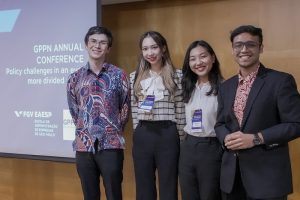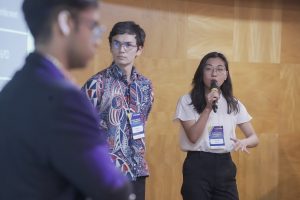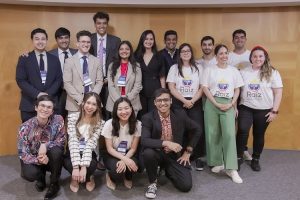For Thailand to meet its climate targets of reaching carbon neutrality by 2025 and net-zero greenhouse gas emissions (GHGs) by 2065, the country needs to carry out initiatives to reduce its dependence on oil imports and engage in energy transition policies to prepare the market for electrical vehicles, while continuing the promotion of ethanol-blend fuels and vehicles. To achieve these ambitious goals, the country must address its high volume of “end-of-life” vehicles that are still running on conventional petroleum-based fuels and ethanol-blend fuels at a 10% concentration or lower. Moreover, as the Thai government is currently in the process of phasing out E10 and ULG, and adopting E20 as primary fuel at gas stations, it has created a concerning polarizing effect among vehicle owners who have and does not have the purchasing power to fully integrate and adapt into a transport sector that only offers E20 blends. The current energy and transport landscape of Thailand renders it challenging for the country to fully become a production and consumption hub, which is why the role of motorcycles, the most common form of transport in Thailand, running on ethanol-blend fuels at a 20% concentration or higher is critical to ensuring a successful energy transition for the country. Hence, our proposed program (MRRP) aims to enable an effective and efficient conversion of end-of-life motorcycles into E20-compatible motorcycles, in tandem with a sustainable recycling process, in order to increase bioethanol consumption in Thailand and support those who need an extra hand in buying a new motorbike, so as to not leave them behind in the market sweep of E20 fuel. Specifically, it provides a step-by-step framework for collecting and recycling, as well as incentives for motorcycle owners to purchase E20 and flex-fuel vehicles to increase bioethanol consumption and reduce CO2 emissions. For our long-term goal, we believe the proposal to be innovative as it is pragmatically designed to accommodate the incoming regulatory framework on the management and disposal of ELVs not limited to motorcycles that the government will implement in the near future.

Members
Moe Furukado is currently a first-year MPP/IP student at GraSPP. Born in Japan, she spent her academic life in diverse Asian cities including Shanghai and Hong Kong, and has completed her bachelor’s degree at The University of Hong Kong as well as pursued an exchange program at Sciences Po, Paris. Aspiring to work internationally to leverage her fluency in English, Chinese, and Japanese, she is currently an intern at the World Economic Forum Japan Centre focusing on government innovations required for cyber-physical systems societies. During her undergraduate years, Moe also experienced working at Resolve Foundation Hong Kong, an NGO that advocates for ethnic minorities’ rights in Hong Kong and has served as a Chairperson for the Change-makers network, a student-led online platform that connects people to facilitate discussions related to global issues. Furthermore, she is passionate about fashion and sustainability issues related to the fashion industry.
Hiroki Ito is a first-year MPP/IP student at GraSPP and is planning to participate in the double degree program with the Crawford School of public policy at Australian National University (ANU). Prior to pursuing his master’s degree at GraSPP, he received a bachelor’s degree from International Christian University, majoring in public policy with a minor in environmental studies. He is interested in the blue economy in the Asia and Pacific region and hopes to further develop his competencies and understanding of this issue through his master’s program.
Kavin Pillai is an Indian first-year MPP/IP student at GraSPP. With an undergraduate degree in History and International Relations from India and a Middle Eastern upbringing, he worked on developing a holistic and all-encompassing skill set that linked his diverse background with a wide range of his interests and experiences. This culminated in a big change of paths during the pandemic, where he took a call to hone in on the field of public policy. His major interests in this area include foreign policy, climate change and energy, artificial intelligence, education, and sports! Having worked with Indian and Middle-Eastern think tanks, NGOs, and media organisations on policy research and public communication, he continues to develop his passion for discussing various socioeconomic and political trends, while attempting to bring in a fresh perspective/twist by leveraging his connect with pop culture in order to have his ideas resonate with the general public!
Emily Zhu is a first-year MPP/IP student at GraSPP. Prior to coming to GraSPP, she completed her undergraduate degree in International Development and Psychology at McGill University in her home city, Montreal, Canada. Her desire to pursue a Master’s degree in Public Policy was honed through her work and community engagement experience in the non-profit sector for youth mental health, asylum-seekers rights, and eco-citizenship education, as well as her short time working in the federal government. While her interests fall into a wide range of categories, she is particularly keen on learning more about the application of behavioural insights in public policy.
Student report
Reinforcing my passion for the art of policymaking
It was an absolute privilege for my team and I to have participated in the 2023 GPPN Global Policy Challenge hosted
by the Fundação Getulio Vargas Sao Paulo School of Business (FGV-EAESP) in São Paulo, Brazil. We felt extremely grateful for the opportunity to present our policy proposal in front of an incredible jury panel from the prestigious public policy schools of the GPPN network, and our brilliant peer delegates.
 In the early stages of our proposal, my team and I struggled quite a bit in coming up with a creative and feasible solution that was tailored to the context, and existing regulatory landscape of Thailand. Eventually, with the support of our advisors, Professor Hanai and Professor Arima, who connected us to his incredible network at the Economic Research Institute for ASEAN and East Asia, and the Ministry of Energy of Thailand, we were able to come up with a solid, comprehensive proposal that earned us the Best Prize at the conference. In addition, the critical feedback from our GraSPP professors during the preparation phase was invaluable and allowed us to constantly improve our proposal and presentation. Our “Motorcycle Recycling and Renewal Program (MRRP)” which aims to enable the conversion of end-of-life motorcycles into E20-compatible motorbikes, as well as boost bioethanol consumption and support consumers in purchasing new motorbikes, could not have been possible without help of the entire GraSPP community.
In the early stages of our proposal, my team and I struggled quite a bit in coming up with a creative and feasible solution that was tailored to the context, and existing regulatory landscape of Thailand. Eventually, with the support of our advisors, Professor Hanai and Professor Arima, who connected us to his incredible network at the Economic Research Institute for ASEAN and East Asia, and the Ministry of Energy of Thailand, we were able to come up with a solid, comprehensive proposal that earned us the Best Prize at the conference. In addition, the critical feedback from our GraSPP professors during the preparation phase was invaluable and allowed us to constantly improve our proposal and presentation. Our “Motorcycle Recycling and Renewal Program (MRRP)” which aims to enable the conversion of end-of-life motorcycles into E20-compatible motorbikes, as well as boost bioethanol consumption and support consumers in purchasing new motorbikes, could not have been possible without help of the entire GraSPP community.
My teammates, Moe, Hiroki, and Kavin, each brought unique perspectives informed by their diverse experiences to the proposal drafting process, something which I strongly believe contributed to the innovative and inclusive dimensions of our proposal. I am extremely grateful for their hard work, positive attitude, and critical insight, from the first day when we joined as a team, to our last day in Brazil. Despite all the challenges, this experience was filled with fun and joy thanks to them!
This year’s GPPN conference was a special one as it was the first in-person one since three years ago. The excitement and joy were palpable from the very first day as everyone was finally able to reconvene again in person. It was wonderful to interact and meet the students from other universities, and given the existing partnerships between the schools for exchange and double-degree programs, it was great to know that some of us will be able to see each other again soon! I was deeply impressed by the amazing proposals and outstanding presentations from the other delegates. What really stuck with me was the diversity in themes and issues that were addressed by all the policy proposals. Witnessing the commitment, dedication, and passion that all the delegates brought to the conference reinforced my own passion for the art of policymaking. Given this year’s theme, ‘Policy challenges in an ever more divided world’, seeing so many proposals that aimed to decrease division or increase unity across different cultures, and societies was inspirational.
 The success of the conference would not have been possible without the efforts of our lovely hosts at FGV-EAESP. Experiencing a fragment of Brazil through the delicious food, the walking tour on Paulista Avenue, and the insightful talks by Dr. Cláudio Gonçalves, Dr. Ana Maria Malik, and Dr. Adriano Massuda was a privilege and unforgettable experience. While our stay was short, my team and I hope to visit Brazil in the future again! For anyone who finds passion in developing policy proposals for an issue that is close to their heart, and who wishes to hone and sharpen their policymaking skills, the GraSPP Policy Challenge and the GPPN conference are something that I highly recommend!
The success of the conference would not have been possible without the efforts of our lovely hosts at FGV-EAESP. Experiencing a fragment of Brazil through the delicious food, the walking tour on Paulista Avenue, and the insightful talks by Dr. Cláudio Gonçalves, Dr. Ana Maria Malik, and Dr. Adriano Massuda was a privilege and unforgettable experience. While our stay was short, my team and I hope to visit Brazil in the future again! For anyone who finds passion in developing policy proposals for an issue that is close to their heart, and who wishes to hone and sharpen their policymaking skills, the GraSPP Policy Challenge and the GPPN conference are something that I highly recommend!
Written by Emily Zhu, 1st year MPP/IP

